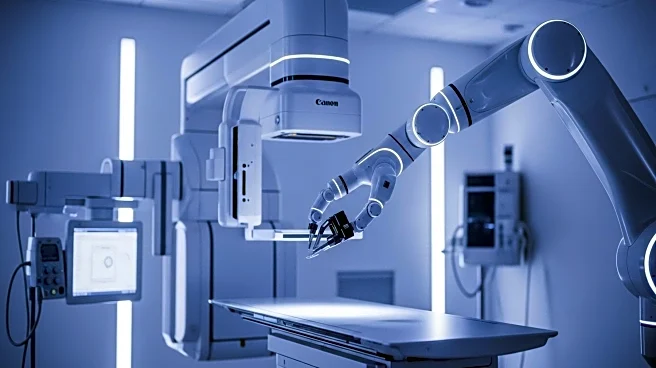What's Happening?
RSNA Ventures, a subsidiary of the Radiological Society of North America, has formed a strategic partnership with Rad AI, a leader in generative AI for healthcare. This collaboration aims to advance innovation in radiology and imaging technologies, addressing the increasing pressure on radiologists due to rising imaging volumes. The partnership will integrate over 100 years of RSNA's peer-reviewed knowledge into radiologists' daily workflows through Rad AI Reporting, providing immediate access to case-based insights during image interpretation. This integration is expected to enhance radiologists' ability to deliver rapid, data-backed recommendations with greater confidence.
Why It's Important?
The partnership between RSNA Ventures and Rad AI is significant as it addresses the growing challenge faced by radiologists in managing the increasing volume of medical imaging. By embedding trusted knowledge directly into workflows, radiologists can improve the speed and accuracy of their diagnoses, ultimately enhancing patient care. This collaboration represents a critical step in leveraging AI to optimize healthcare practices, potentially setting a precedent for other medical fields to follow. The integration of AI in radiology could lead to more efficient use of resources and better outcomes for patients, benefiting the healthcare industry as a whole.
What's Next?
The collaboration is expected to continue evolving, with potential expansions in the integration of AI technologies into other areas of healthcare. Stakeholders, including healthcare providers and technology developers, may explore similar partnerships to enhance their services. As AI becomes more embedded in medical practices, regulatory bodies might also consider updating guidelines to ensure the ethical use of AI in healthcare. The success of this partnership could encourage further investment in AI-driven solutions, fostering innovation across the medical field.
Beyond the Headlines
This partnership highlights the ethical considerations of integrating AI into healthcare, particularly in ensuring that AI-driven decisions are grounded in peer-reviewed knowledge. It also underscores the importance of continuous education for healthcare professionals to adapt to new technologies. The collaboration may influence cultural shifts within the medical community, promoting a more data-driven approach to patient care.










